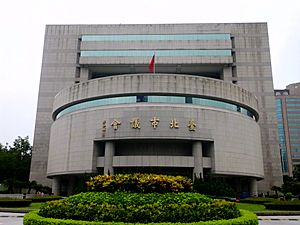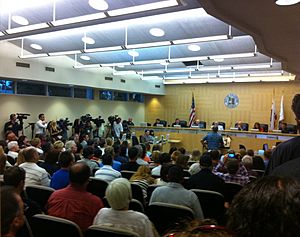Municipal council facts for kids
A municipal council is like the main team that makes decisions for a town, city, or local area. It's the group of people chosen by the community to help run things. Depending on where you are, this team might be called a city council, town council, village council, or something similar. They work to make their local area a good place to live.
Contents
What is a Municipal Council?
A municipal council is the main law-making group for a local area. These areas are often called municipalities or local government areas. The council members are usually elected by the people who live there. Their job is to create rules and make decisions that affect everyone in the community.
Municipal Councils Around the World
Australia
In Australia, the name "city council" usually means a local area that has been officially given "city status." This often happens when an area has a certain number of people living there. Some big cities are run by one large council. Other urban areas might have many smaller city councils.
Belize
Belize has seven town councils. Each council has a mayor and several councillors. These people are elected every three years. Town councils in Belize are in charge of things like keeping streets in good shape, lighting, trash collection, and public parks.
Canada
In Canada, local councils play a big role in how communities are run.
Ontario
In Ontario, township councils are similar to city councils. They manage smaller towns or lower-tier municipalities. Council members are elected every four years. The number of councillors depends on the size of the municipality. Their duties are set by the Municipal Act.
Manitoba
In Manitoba, town council members help set the direction for their community. They usually have five to seven members. The head of the council is called the mayor or reeve.
China
In China, municipal councils are known as Municipal People's Congresses. You can find these in many large cities, like the Shanghai Municipal People's Congress. They act as the local government body.
France
Every town in France, no matter its size, has a mayor and a municipal council. They manage the town from the mairie, which is like a city hall. All councils have the same powers. The only exception is Paris, where the central government handles the city police. The number of council members depends on how many people live in the town.
Hong Kong
Hong Kong used to have municipal councils. The first one, the Sanitary Board, started in 1883. It later became the Urban Council in 1936. This council provided services to Hong Kong Island and Kowloon. People could vote for its members. A similar council, the Regional Council, was set up for the New Territories in 1986. Both councils were stopped in 1999.
India
In India, local governments for cities are often called municipalities.
Japan
Municipal councils in Japan are parliamentary bodies. They are set up in local areas following the country's laws. Examples include the Yokohama City Council and the Osaka City Council.
Moldova
Moldova has municipal councils in five main cities. These councils help make decisions and set general policies. They have a certain number of counsellors elected every four years. These counsellors represent political parties or are independent. The mayor of the municipality is also elected for four years.
Netherlands
In the Netherlands, the municipal council (Dutch: gemeenteraad) is the elected group for a municipality. It has between 9 and 45 members. Citizens elect them every four years. The council's main jobs are to set the city's policies. They also watch over how the city's executive board carries out those policies.
New Zealand
Local councils in New Zealand have different structures. They are overseen by the government's Local Government New Zealand department. Before 1989, a town with over 20,000 people could be called a city. In 1989, many councils were combined to create 87 new local authorities. Now, the word "city" can mean a major urban area, even if its official council is called a "district council." For a new city to be formed today, it needs at least 50,000 people.
Norway
The municipal council (Norwegian: Kommunestyre) is the highest governing body in a Norwegian municipality. It decides what the municipality will do and makes big decisions. The council is led by a mayor (ordfører). It is divided into an executive council and other committees.
Palestine
The Palestinian National Authority created village councils. These councils act as local governments and provide services for villages and small towns.
Philippines
In the Philippines, all municipalities have their own municipal council, called "Sangguniang Bayan". Cities have a similar group called "Sangguniang Panlungsod" (city council). The Local Government Code of 1991 set up these local government structures. City councils can have from 12 to 38 members. Members of city councils are called "councilors."
Republic of Ireland
In the Republic of Ireland, five county boroughs became cities with city councils. These councils have the same legal status as county councils. More recently, some city and county councils have been combined. For example, Limerick City and County Council was formed by joining two older councils.
Singapore
In Singapore, town councils are in charge of keeping common areas in Housing and Development Board (HDB) housing estates tidy. This includes corridors, lifts, and open spaces. They are regulated by the Town Councils Act. The idea is to let Members of Parliament help manage these estates. This also makes them responsible to the people who elected them. Town council areas are based on electoral districts.
Taiwan
In Taiwan, a municipal council represents a special municipality or a provincial city. Council members are elected through local elections held every 4–5 years. Examples include the Taipei City Council and the Kaohsiung City Council.
Ukraine
Almost all cities in Ukraine have their own City Councils. The mayors, who are usually elected by the people, lead these councils. Examples include the Kyiv City Council and the Lviv City Council.
United Kingdom
In the United Kingdom, not all cities have city councils. Their roles and powers can be different.
England
In England, a "town council" is a specific name for a local parish council that has decided to call itself a town council. If a larger local council covers a single town, it might be called a 'borough council'. These are the most local level of government. The head of a town council is called a "town mayor."
A city council in England can be:
- The council of a metropolitan district that has been given city status.
- The council of a non-metropolitan district with city status.
- A parish council that has been given city status. These councils have limited duties.
- The council of a London borough with city status, like Westminster City Council.
Northern Ireland
Belfast City Council is currently the only city council in Northern Ireland. Since 2015, other cities are part of larger districts and do not have their own councils.
Scotland
In Scotland, a city council is the council for one of four areas officially called a City. Other cities in Scotland do not have their own city council.
Wales
In Wales, the lowest level of local government is called a community council. A community council can choose to call itself a Town Council. This does not change its powers. A city council in Wales can be one of three councils for main areas with city status. It can also be one of three community councils with city status, which have limited duties.
United States
City councils and town boards in the United States usually have several elected members. These members are often called council members or councilmen/councilwomen. In Canada, they are called councillors.
The mayor might be a voting member of the council and its leader. Or, the mayor might be the city's separate chief executive. The council acts like a law-making group. They suggest new rules, vote on them, and pass laws to help run the city. The mayor's role depends on the city's government style.
Some cities have a "mayor pro tem" or "vice mayor." This person acts as mayor if the main mayor is away.
Indiana
In Indiana, town council members act as both the executive and law-making parts of the government for small towns. They have three or five members. Council members are elected for four-year terms. After an election, they choose a president to set meeting plans and speak for the town. They work with an elected town clerk, who handles daily business. The council also decides on hiring other staff, like police officers or utility workers.
Massachusetts
Town councils in Massachusetts are like city councils. They are found in towns that have chosen a city-style government but still keep "town of" in their name. The main law-making body for a legal town in Massachusetts is a town meeting. The executive board is a board of selectmen.
Michigan
In Michigan, there are many incorporated villages. These are governed by village councils. A village council has a village president, trustees, a clerk, and a treasurer. Villages are different from cities because they share some duties with their surrounding township.
New Hampshire
In New Hampshire, the Town Council is an elected group. It acts as both the law-making and executive body for the town. The town is governed by a special document called a charter. This charter sets out the council's powers and rules.
Official Ballot Town Council
This is a special type of Town Council. In this system, the town council votes on most matters. However, some important decisions are voted on directly by the public using an official ballot. The council decides what goes on this ballot.
Ohio
In Ohio, the standard form of local government limits the council's power. It does not allow them to review contracts or do administrative tasks. However, a city can create its own charter. This charter can give the council more administrative powers. For example, the City of Kent, Ohio has a charter. In Kent, the mayor is mainly for ceremonial purposes and has no administrative duties.
Two-Part Councils
Some cities used to have two-part, or "bicameral," city councils. This means they had two separate groups of members, like a "Common Council" and a "Board of Aldermen." This was similar to how federal and state governments work. Most cities stopped using this system in the 20th century to save money. For example, Philadelphia City Council used to have two parts until 1919.
Other Local Government Terms
- Community council: The lowest level of local government in parts of the UK.
- Rural Council: A former name for local councils in the Philippines.
- Selsoviet: A historical term for the lowest administrative division in rural areas in the Soviet Union.
- Village council (Palestinian Authority)
- Rural Municipality or Gaunpalika (Nepal)
See also
 In Spanish: Concejo municipal para niños
In Spanish: Concejo municipal para niños
- County council
- Municipal elections
- Municipal corporation
- Petitions and E-petitions (ways to ask city councils for action)
- Trustee (another term for a city government board member)
 | William Lucy |
 | Charles Hayes |
 | Cleveland Robinson |



